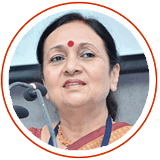Snigdha Poonam

Snigdha Poonam

Anahita Speaker Series
CARNEGIE INDIA VEDICA INITATIVE
The Rise of Fake News in India
The dissemination of information through smartphones and affordable internet has slowly changed the traditional role of the media, leading journalists to continuously adapt. Though these new technologies allow audiences to experience a new sense of transparency and accessibility, particularly in their experience of connecting with public figures, they have also led to higher levels of information misuse among users.
In the fourth edition of the Anahita Speaker Series, Snigdha Poonam, a national affairs writer with the Hindustan Times, explored the rise of "fake news" in India. The discussion was moderated by Upasana Sharma, a research assistant at Carnegie India.
Discussion Highlights
- Intermediary to Translator: Participants noted that the current era of social media allows audiences to receive their news straight from the source in the form of posts, which has led to a revolution in reporting. They observed that this new "transparency" has been a highly disruptive phenomenon that has transformed the media from being the intermediary spokesperson to the translator of social media posts. Consequently, many social media platforms that lack any screening process have suddenly gained legitimacy as alternatives to traditionally reported news.
- Stratified Organization of Fake News: Participants agreed that fake news is no longer being considered a rare or isolated phenomenon, but appears to be organized and shrewdly disseminated to a target population. They noted the high possibility of these organized bodies coming into existence with the help of political influence. In particular, the participants pointed to the high quality and seemingly professional nature of doctored videos and written material, and the purposeful nature of the dissemination of this fake news. They noted that, while some newspapers have taken the initiative of reporting fake news regularly, these efforts have not yet made much more than a dent in reversing the effects of fake news. Despite this, participants noted that there is much more awareness and coverage on the subject today than ever before.
- Vernacular Social Media Platforms: Participants noted the immense popularity of vernacular social media platforms in India. They further recognized the salience of these platforms in nurturing a sense of community amongst their users. The participants accepted that the extensive number of users on these platforms may be a contributing factor to the quicker dissemination of fake news. They noted that these platforms may appear to be insulated by their respective languages, therefore providing a barrier to centralized detection. However, given the cultural nature of this problem, any solution to it must be of a similar nature and scale, participants agreed. They proposed holding town halls in villages to promote a cultural understanding of fake news and its effects, as a possible solution.
- Navigating Uncharted Territory: The participants addressed the question of the safety of female investigative journalists. They acknowledged that it is tougher for women to enter into and report on volatile and hostile situations due to these spaces being male-dominated. Additionally, they observed that, in India, traditional patriarchal constraints tend to stifle the voice of women, and create an invisible barrier between a woman journalist and her male interviewees. However, participants also noted that there is a tendency for male interviewees to be more vulnerable—with respect to certain issues—around female interviewers, as compared to male ones. These settings, the participants stated, provide women journalists with a unique insight into the lives and realities of their interviewees. Despite this, however, participants noted that journalism remains a male-dominated field, particularly with respect to on-ground reporting. They consequently agreed that perseverance and patience are key for women journalists to succeed.
This event summary was prepared by Medha Prasanna, a research intern at Carnegie India.




















